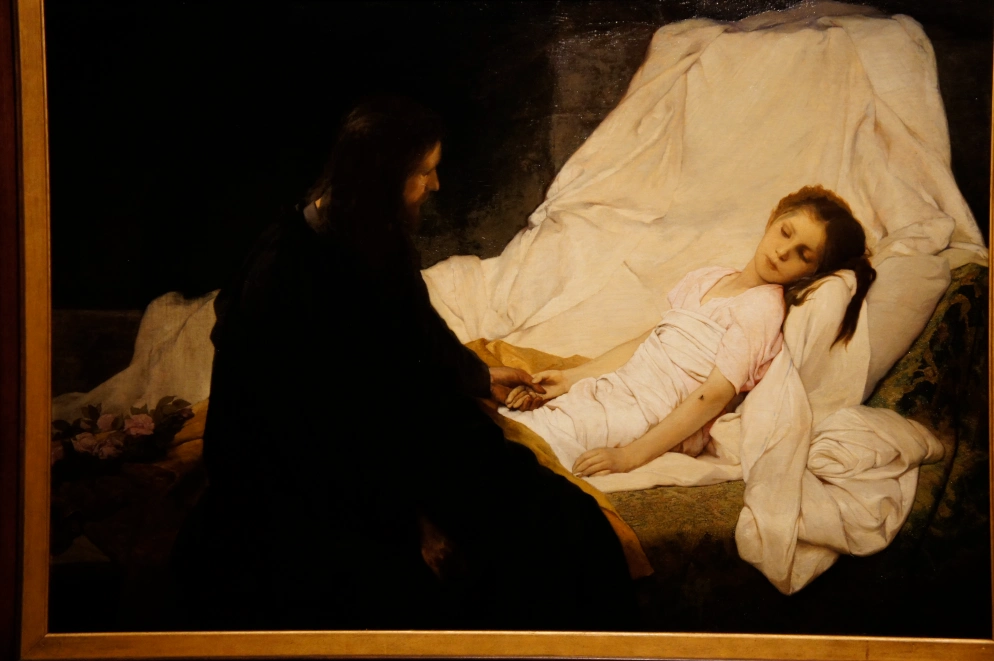Christ’s Power Over Every Need
The Gospel of Mark Sermon Series
“Who Do You Say That I Am?”
Mark 8:27-9:1
Introduction
The captain of the ship looked into the dark night and saw faint lights in the distance. Immediately he told his signalman to send a message” “Alter your course 10 degrees south.”
Promptly a return message was received: “Alter your course 10 degrees north.”
The captain was angered; his command had been ignored. So he sent a second message: “Alter your course 10 degrees south–I am the captain!”
Soon another message was received: “Alter your course 10 degrees north–I am seaman third class Jones.”
Immediately the captain sent a third message, knowing the fear it would evoke: “Alter your course 10 degrees south–I am a battleship.”
Then the reply came “Alter your course 10 degrees north–I am a lighthouse.”
In the midst of our dark and foggy times, all sorts of voices are shouting orders into the night, telling us what to do, how to adjust our lives. Out of the darkness, one voice signals something quite opposite to the rest- -something almost absurd. But the voice happens to be the Light of the World, and we ignore it at our our peril.[1]
Prayer
God Is Patient With Us As We Take Steps of Faith (vv. 27-30)
And Jesus went on with his disciples to the villages of Caesarea Philippi. And on the way he asked his disciples, “Who do people say that I am?” 28 And they told him, “John the Baptist; and others say, Elijah; and others, one of the prophets.” 29 And he asked them, “But who do you say that I am?” Peter answered him, “You are the Christ.” 30 And he strictly charged them to tell no one about him.
It is in this isolated area, as they are in between crowds, Jesus takes this opportunity to begin teaching the disciples about his journey to the cross, which is about six months away. “It was time that the disciples reveal how much they had been influenced by their environment as well as the direct instruction of Jesus.”[2]
(v. 27) “he asked his disciples, “Who do people say that I am?” – and in their response we see a similar list in Mark 6:14-15 “King Herod heard of it, [Jesus going from village to village teaching and healing] for Jesus’ name had become known. Some said, “John the Baptist has been raised from the dead. That is why these miraculous powers are at work in him.” 15 But others said, “He is Elijah.” And others said, “He is a prophet, like one of the prophets of old.” The world had their own definition of who Jesus was – today the world defines Jesus as they want Him to be (good man, good teacher).
(v. 29) “But who do you say that I am?” – After all the healings, storms on the sea, casting out demons, feeding of thousands, months and months of hearing Him preach . . . Who is Jesus? Jesus had used the phrases, “he who has an ear let him hear,” and “He who has eyes to see, let him see” . . . They have been with Jesus all this time – Has Jesus been successful in showing them who He is?
It is as though the disciples in that back country are standing at a crossroad. To go down one road leads to a further understanding of God, Jesus, and spiritual growth, but everyone seems to be against them, and there is the pain of bearing a cross.
As they look down the second path the world in support of them, there is applause, there are no problems, no suffering, but Jesus is not there. They have to choose between the world and Jesus – you can’t take both roads at the same time. Jesus patiently waits for the answer.
Peter responds, (v. 29) “You are the Christ”— Jesus does not use the word Messiah “to avoid political complications and a revolutionary movement (see Mark 6:45).”[3] But here, he accepts the title Messiah, and “Peter’s confession revealed real insight into the nature of Christ’s person and mission, but this concept of Jesus’ messiahship was far from being perfect. Peter still had much to learn of Messiah’s suffering, rejection, and death, as the immediately incident reveals.”[4]
(v. 30) “And he strictly charged them to tell no one about him.” Jesus does not want them to give a view of Him as the Messiah, because they did not understand and needed further instruction. When they were sent out two-by-two (Mark 6:7-13) they cast out demons, healed the sick and “proclaimed that people should repent.”[5]
Here, they understand that He is the Messiah, as predicted by the Old Testament, but they did not really know what that meant or entailed. Jesus “was had not come to establish a political kingdom. His victory would be that of the Suffering Servant in Isaiah 53.”[6]
Mark shows us in this chapter that everything is a process. Salvation, healing (Mark 8:22-26; the man’s healing took two steps), the growth of the kingdom often takes place in stages.
Following God’s Will Is Not Without Pain (vv. 31-33)
31 And he began to teach them that the Son of Man must suffer many things and be rejected by the elders and the chief priests and the scribes and be killed, and after three days rise again.[7] 32 And he said this plainly. And Peter took him aside and began to rebuke him. 33 But turning and seeing his disciples, he rebuked Peter and said, “Get behind me, Satan! For you are not setting your mind on the things of God, but on the things of man.”
Jesus again refers to himself as “the Son of Man,” (and in the gospel over 81 times). Son of Man was the preferred title by Jesus because it, unlike the term Messiah, was not full of assumed meanings and would not distract from His God-appointed mission.[8]
But there is an OT background in the person who would come as the Son of Man. Daniel 7:3-14 “I saw in the night visions, and behold, with the clouds of heaven there came one like a son of man, and he came to the Ancient of Days and was presented before him. 14 And to him was given dominion and glory and a kingdom, that all peoples, nations, and languages should serve him; his dominion is an everlasting dominion, which shall not pass away, and his kingdom one that shall not be destroyed.”
Jesus here makes three predictions, 1. That he must suffer many things, included in that suffering is being rejected by the elders and chief priests, 2. Be killed, 3. After three days be raised from the dead. This secret is now being revealed to the disciples, “And he said this plainly.”
Jesus tells his disciples plainly that to follow Him will be a path of pain and suffering.
Jesus has shown himself to be the promised Messiah, and now He is beginning to show them that the Savior must suffer to the point of death – A suffering servant.
For Peter, the Messiah was a symbol of strength, not weakness. In Peter’s mind Jesus represented God, and God could not fail, Jesus would be successful, not lose to the religious leaders. Since Jesus is the Christ, God is with Him! Peter pulls Jesus aside and rebukes him – the same word for silencing a demon earlier.[9]
“Peter’s attempt to dissuade him from going to the cross is the same temptation he had experienced from Satan at the outset of his ministry. Satan offered him the option of using the world’s means of accomplishing his mission. Peter was opposing the divine will.”[10] What Peter doesn’t understand is that if Jesus is to be Christ, then He must endure the cross. That has been the plan from the beginning. Hebrews 9:22 “without the shedding of blood there is no forgiveness of sins.”
“Peter’s suggestion represented a very real temptation for Jesus – one that must be rejected forcefully. Jesus is demanding that they accept his mission and his demands for discipleship. Even though Peter had Jesus’ best interest at heart, he was being used as an instrument of Satan (not possession).”[11] God’s Word does not change, we must align our thoughts, wishes, feelings, desires to it – not try to move it to our will.
Jesus’ family came earlier to collect Him because they were concerned for him, Mark 3:20-21 “Then he went home, and the crowd gathered again, so that they could not even eat. 21 And when his family heard it, they went out to seize him, for they were saying, “He is out of his mind.” We must be careful, that like Peter and Jesus’ family, we do not let our personal desires for others to cloud the plan that God has for them. We don’t want those we love to suffer or endure heartache, but it may just be the plan God uses to redeem many.
When Peter hears Jesus saying these words, he is horrified, and he allows his own wished to cloud the truth of Jesus’ words, so Jesus says, “Get behind me, Satan!” – the world does not give the answer to the one big problem we encounter each and every day of our lives – our brokenness because of our sin, and separation from our Creator.
Proverbs 14:12 “There is a way that seems right to a man, but its end is the way to death.”
Also, while Jesus explains that the Savior must suffer, but (v. 31) “and after three days rise again,” Jesus is showing the disciples that he knows that there is pain a suffering coming in the days ahead, but also there is life as well.
What Does Jesus’ Suffering Mean For His Followers? (vv. 34-9:1)
34 And calling the crowd to him with his disciples, he said to them, “If anyone would come after me, let him deny himself and take up his cross and follow me. 35 For whoever would save his life will lose it, but whoever loses his life for my sake and the gospel’s will save it. 36 For what does it profit a man to gain the whole world and forfeit his soul? 37 For what can a man give in return for his soul? 38 For whoever is ashamed of me and of my words in this adulterous and sinful generation, of him will the Son of Man also be ashamed when he comes in the glory of his Father with the holy angels. 9 And he said to them, “Truly, I say to you, there are some standing here who will not taste death until they see the kingdom of God after it has come with power.”
Many would rather take the cross out of the picture, remove it from the church steeple. Get rid of the blood and gore, the scourging, spitting, mocking, and clean Jesus up. Make Him safe, just focus on the “love your neighbor,” and “turn the other cheek.” But Jesus says, (v. 34) “If anyone would come after me, let him deny himself and take up his cross and follow me.”
Suffering is not only the destiny of Jesus, but everyone who would be a follower of Christ. Jesus gives two requirements of disciples, (1) denial of self, (2) taking up one’s cross and following Jesus.
1) denying self – “It is the same word used of Peter’s denial of Jesus, and means “let him make himself a stranger” to himself.”[12]
2) “take up his cross” – “When criminals carried their crosses, it showed those who were watching the identity of the one who had authority over the criminal.”[13] By denying oneself, taking up one’s cross and following Jesus, a disciple acknowledges that he is submitting to Jesus’ authority.
In Luke 23:26 Simon of Cyrene was forced to carry Jesus’ cross on the Via Dolorosa “And as they led him away, they seized one Simon of Cyrene, who was coming in from the country, and laid on him the cross, to carry it behind Jesus.”
Our choice, is often like Peter’s; we choose our own self-interest – what works best for me, what I believe to be most beneficial for me. When you become a follower of Jesus you lay that self down and crucify it. You then take up Christ’s will for your life.
You have to lose and deny yourself, “For whoever would save his life will lose it,” and it is in this process of giving your life to Christ, and then having faith in His plan for your life, and seeking to follow His will, that true living is gained.
There is nothing more important than this (daily) decision of being safe and saving yourself from pain, suffering, loss, etc. and the loss of the life that God intends for you to have, “36 For what does it profit a man to gain the whole world and forfeit his soul?” –
Jesus wants everyone to fully understand the cost of being a Christ follower. Luke 14:28 “For which of you, desiring to build a tower, does not first sit down and count the cost, whether he has enough to complete it?” There is pain for the sake of others, we lay our lives down so that others may know who Christ is, and the exchange is our souls, we gain a life of purpose and fulfillment. There is death and sacrifice, but there is also resurrection and eternal life.
Jesus rebukes Peter because there is the temptation to not follow God’s plan. We face the same temptation, and the harder and painful the task, the more we are tempted to avoid it. But to be a follower of Christ, is willingly to face those things head because it is the will of God.
A couple of years ago, it was becoming clear to me that God was calling us from where we were to somewhere else – So we had a family meeting and I began to share this with the family. Their reaction was, “Dad, can’t you just work here, get a job here,” and my response is that “we have to go where God tells us to go.” So, my soon to be senior and incoming freshman high school student, would be moving to a potential new school, my wife would leave a job she loved, and we would go to a church where I would serve as pastor. It would have caused less pain for my family to stay – and I could have got a job in the community – but it would be at the expense of waking away from a calling.
____________________
[1] http://www.sermonillustrations.com/a-z/l/lorship_of_christ.htm
[2] Archibald Thomas Robertson, Word Pictures in the New Testament, Volume 1 (Nashville, Tennessee; Broadman Press, 1932) 334.
[3] Robertson, 334.
[4] Frank E. Gaebelein, The Expositor’s Bible Commentary, Volume 8 (Grand Rapids, Michigan; Zondervan Publishing, 1984) 694.
[5] Mark 6:12
[6] Max Anders, Holman New Testament Commentary, Mark (Nashville, Tennessee; Holman Reference, 2000) 135.
[7] Three passion announcements in Mark 8:31; 9:31; 10:32-34.
[8] Gaebelein, 695.
[9] Larry W. Hurtado, New Testament Biblical Commentary, Mark (Peabody Massachusetts; Hendrickson Publishing, 1989) 137.
[10] Gaebelein, 696.
[11] Anders, 136.
[12] George Arthur Buttrick, The Interpreter’s Bible, Volume 7 (Nashville, Tennessee; Abingdon Press, 1953) 770.
[13] Anders, 136.




 Jairus knows that his daughter is about to die, and he has two options. Stay and be with her when she dies (which is imminent) or go find Jesus – so he has found Jesus, but she dies before they can get back to the bedside.
Jairus knows that his daughter is about to die, and he has two options. Stay and be with her when she dies (which is imminent) or go find Jesus – so he has found Jesus, but she dies before they can get back to the bedside.